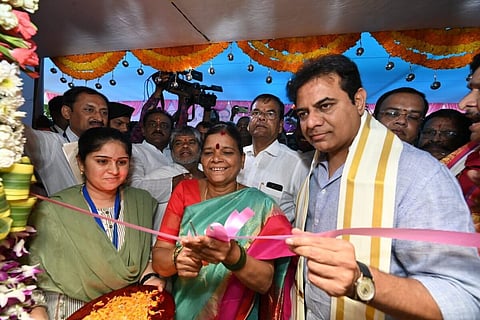

Days after the Greater Hyderabad Municipal Corporation (GHMC)’s ward office system was launched by Telangana Minister for Municipal Administration and Urban Development KT Rama Rao, Hyderabad-based NGO Forum for Good Governance filed a petition in the Telangana High Court on June 19, dubbing the state government’s decentralisation plan for GHMC “arbitrary and illegal”. Activists are calling for a different approach, that of constituting ward committees comprising of citizens, to ensure democratic decision-making and transparency to effectively curb corrupt activities.
On June 16, KTR inaugurated the ward office system, saying it would streamline GHMC’s services and ensure faster access for Hyderabad residents. The decentralisation plan entails ward offices across the city, with an Assistant Municipal Commissioner heading each ward. Forum for Good Governance has demanded that the government must set up ward committees instead of offices, to foster citizens’ participation.
“The chief difference between offices and committees for a ward lies in citizens’ participation. Committees involve the public, offices don’t. Of the 129 municipalities and 12 municipal corporations in the state of Telangana, nearly all have ward committees. There is no reason why Hyderabad alone shouldn’t have any,” M Padmanabha Reddy, Secretary of Forum for Good Governance told TNM.
Padmanabha Reddy argued that ward offices, run by bureaucrats lack transparency and accountability, and have the potential to breed corruption, unlike committees which let the residents of a locality decide how problems can be dealt with. “It isn’t that individuals will be left to administer by themselves. Officials or local NGOs can train committee members to make the process more participatory and effective,” he added.
Aside from making a case for public participation, Padmanabha Reddy also argued in the petition to the High Court that not appointing ward committees was a violation of Article 243S (Constitution and composition of ward committees) of the Constitution of India and Section 8A (Constitution, composition and functions, rights of ward committee, etc.) of the GHMC Act.
Section 8A of the GHMC Act prescribes that a ward committee shall be constituted for each ward of the Corporation, chaired by the Councillor representing the ward, with not more than ten electors representing the civil society from the ward to be nominated by the Corporation itself. Half of the nominees on the ward committee shall be women, and the Commissioner shall nominate a GHMC officer to act as its secretary.
However, defending the benefits of ward offices, Assistant Municipal Commissioner (AMC) of Habsiguda ward K Sangeetha remarked, “Earlier, if a person had a civic issue they would have to approach their Circle office, which manages four to five wards. Now with the new decentralisation plan, each ward is managed within its own locality, reducing the strain on citizens. Secondly, ward offices are able to solve problems in 24-48 hours unlike earlier when it would take 3-4 days.”
Meanwhile, president of the Greater Hyderabad Municipal Corporation Employees’ Union, Udhari Gopal, brought up another concern. “Decisions related to the GHMC are currently made hastily, in a rash manner. Even with the decentralisation plan, for a city of 1.2 crore people, 27,500 workers don’t suffice. There is a need for at least thrice as many GHMC employees to properly run this city,” he said.
AMC Sangeetha said that each ward office consists of 10 GHMC employees who shall address various issues ranging from drainage to electricity works and urban biodiversity. “A person could directly approach their ward office seeking a resolution to felling of trees, an untreated manhole, water supply issues or any other civic problem,” she said.
During the launch of the ward offices, Bharat Rashtra Samithi (BRS) working president KTR said that the existing dearth of bureaucracy at the ward level can be repaired by the ward office system, bridging the gap between residents and ward-level employees and promoting local governance.
However, responding to the petition by Forum for Good Governance, the Telangana High Court directed the Chief Secretary, Principal Secretary of the Municipal Administration and Urban Development Department and the GHMC Commissioner to furnish reasons by August 21 for establishing ward offices instead of constituting ward committees.